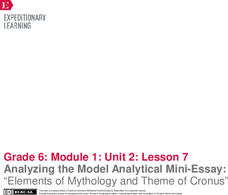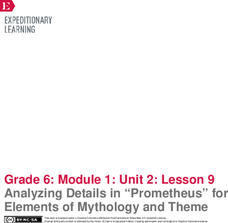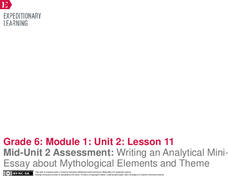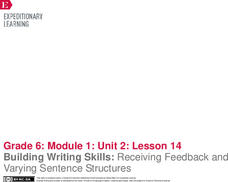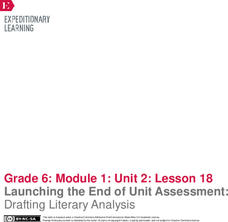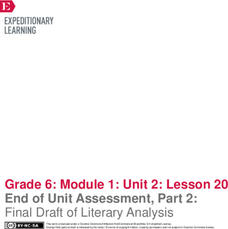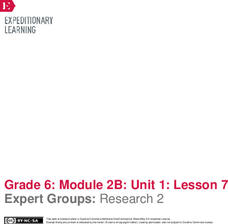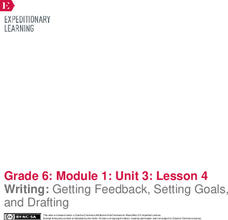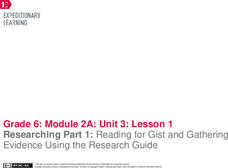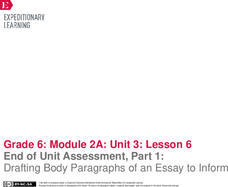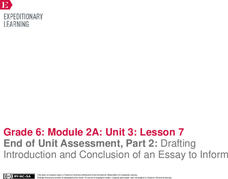EngageNY
Connecting Literary and Informational Texts: Cronus and “The Key Elements of Mythology”
Is there a connection? Scholars work to make connections between Myth of Cronus and The Key Elements of Mythology. First, they circle important words in the text and look for similarities. They then revisit the concept of theme and...
EngageNY
Analyzing the Model Analytical Mini-Essay: “Elements of Mythology and Theme of Cronus”
It's time to make a claim. Scholars learn what it means to make a claim by first looking at a model analytical mini-essay to determine how the author relayed ideas. Pupils then work with partners to discuss how the author might have...
EngageNY
Exploring Allusions to Myths in The Lightning Thief: Close Reading Part 1 of “Prometheus”
It's all just an allusion. Scholars learn the meaning of allusion and read an allusion in The Lightning Thief. Learners gather in their triads and discuss questions from the text to take a close look at vocabulary words and choose...
EngageNY
Analyzing Details in “Prometheus” for Elements of Mythology and Theme
Well isn't that clever? Scholars read Prometheus, a tale describes the clever Greek god and trickster. They tune into details and complete graphic organizers that reveal the theme of the text.
EngageNY
Drafting an Analytical Mini-Essay: Using Partner Talk and Graphic Organizers to Guide Thinking
Moving on up ... Scholars take a look at how the author of the model essay Elements of Mythology and Theme of Cronus moved up in the writing process from a graphic organizer to an essay. After walking through the writing process of the...
EngageNY
Mid-Unit 2 Assessment: Writing an Analytical MiniEssay about Mythological Elements and Theme
Two is company. Scholars pair up to continue their mini essay writing from the previous instructional activity. They work on their introduction and conclusion paragraphs and then trade partners for peer feedback and a fresh set of eyes...
EngageNY
Connecting the Theme of the Expert Group Myth to a Theme in The Lightning Thief and to Life Lessons
Expert groups discuss the theme of their myths and the life lessons people learn from it. They then regroup their triads so that there is a pupil from each expert myth group and share details about their myths. The class also talks about...
EngageNY
End of Unit Assessment, Part 1: Revising Claims and Evidence based on Feedback
What to do with all that feedback? Scholars use colored writing instruments to circle any feedback that relates to the first two rows of the grading rubric. After working on revisions for their papers, learners view the performance task...
EngageNY
Determining Theme: Reading Myths in “Expert Groups”
Leave it to the experts. Scholars work in expert groups to analyze new myths. Each group is assigned to become an expert on either The
Fates, The Story of Medusa and Athena, or Theseus and the Minotaur. They answer questions and...
EngageNY
Building Writing Skills: Receiving Feedback and Varying Sentence Structures
Everyone is good at something. Scholars receive their mid-unit assessments with feedback. They look over their papers and write their strengths as a writer and goals on index cards. The class then has a mini lesson in using sentence...
EngageNY
Launching the End of Unit Assessment: Drafting Literary Analysis
Is there a connection? Scholars work to write a summary and theme to connect The Lightning Thief and myth of Cronus. They begin by looking at a model essay and then work on their own drafts.
EngageNY
Peer Critique and Pronoun Mini-Lesson: Revising Draft Literary Analysis
See what peers really think. Scholars give a peer critique of the their essay drafts from the previous lesson. They then participate in a mini lesson about pronouns. Pupils write examples of each type of pronoun on sticky notes and put...
EngageNY
End of Unit Assessment, Part 2: Final Draft of Literary Analysis
Row, row, row, row four. Classmates take a look at row four in the writing rubric and begin the exercise by identifying any unfamiliar words. Literary scholars then use feedback from their initial drafts and the writing rubric to begin...
EngageNY
Expert Groups: Research 2
Continue on. Scholars continue the research they began in their expert groups in instructional activity six. They read text and task cards from their research folders and share what they have gathered in research thus far. Individuals...
EngageNY
“The Hero’s Journey”: Analyzing a Model Narrative and Continuing to Plan a New Hero’s Journey Narrative
Many elements go into an engaging narrative story. Using a helpful resource, scholars analyze a model narrative and deconstruct it using a graphic organizer. Next, they apply their learning from the model to update their plans for their...
EngageNY
Writing: Getting Feedback, Setting Goals, and Drafting
Why is it important to set goals as a writer? Scholars process feedback from their mid-unit assessments, writing down their strengths and weaknesses on index cards. Next, pupils use the feedback to begin drafting their hero's journey...
EngageNY
Writing to Show, Not Tell: Dialogue, Sensory Words, and Strong Action Verbs
Consume, gobble, devour ... serving up strong verbs! Writers focus on using dialogue, strong action verbs, and sensory details in their writing. After analyzing a model narrative, they apply their learning to their own hero's journey...
EngageNY
Writing: Analyzing the Conclusion of “The Golden Key” and Drafting a Compelling Conclusion for the Hero’s Journey Narrative
There's something different here. Using a note-catcher, scholars determine the differences between the conclusion of a piece of analytical writing and the conclusion of a narrative. Next, they begin drafting their own narrative...
EngageNY
End of Unit Assessment: Final Draft of Hero’s Journey Narrative
All journeys must come to an end. Using the final lesson in the series, pupils analyze a model narrative for use of transitional words and phrases. Next, they apply their learning to their final drafts of their hero's journey...
EngageNY
Researching Part 1: Reading for Gist and Gathering Evidence Using the Research Guide
If only life came with an owner's manual. Pupils assemble with their research teams to discuss which of Steve Jobs' rules to live by most resonates with them. Scholars also read informational texts in pursuit of finding the gist and...
EngageNY
Researching Part 2: Reading for Gist and Gathering Evidence Using the Researcher’s Notebook
The gist should be short and sweet! Pupils practice finding the gist of an informational text and then write a summary of the text. Next, they gather with their research teams to discuss a focus question based on the novel Bud, Not Buddy...
EngageNY
Analyzing the Structure and Content of an Essay to Inform
Outlines are a great asset to essay planning. Scholars read and analyze a model essay about the importance of daily reading and consider how it would look in an outline format. Next, they outline their own informative essays about rules...
EngageNY
End of Unit Assessment, Part 1: Drafting Body Paragraphs of an Essay to Inform
Anybody can write a body paragraph! Pupils analyze the development of ideas in a body paragraph from a model essay. Next, using what they've learned, they draft the body paragraphs of their My Rule to Live By informative essay.
EngageNY
End of Unit Assessment, Part 2: Drafting Introduction and Conclusion of an Essay to Inform
A powerful introduction and conclusion can really pack a punch. Using the resource, scholars first read and discuss a model essay. Then, as part of the end of unit assessment, they draft the introductory and concluding paragraphs of...
Other popular searches
- English Grammar
- English as a Second Language
- English Language Arts
- Nets Force English
- English Usage
- Future Tense English Grammar
- English Literature
- English Explorers
- English Language
- English Grammar Worksheets
- English Law
- English Civil War



